For a long time it was my dream to go to culinary school.
In high school when I started baking, I jokingly told my mom that I wanted to become a pastry chef, thinking she wouldn’t take me seriously. But to my surprise, she immediately suggested I look into culinary schools.
My initial thought was, “Wait, that’s a thing?”
Now, six years later, I understand the role that cooking schools play in the food industry. And now I also strongly believe that, to become a successful cook you don’t necessarily need to go to culinary school.

Photo courtesy of careerrealism.com
Social norms have it that to get a real job and to be successful in life, one must go to college first. From an educational standpoint that makes sense – the more you know about something the better you’ll be as a worker in that field.
But when it comes to culinary school, the investment doesn’t really make sense.

Gif courtesy of giphy.com
There are an insane amount of things people don’t get about working in food service. This misunderstanding, combined with the perception that to succeed you have to get some form of professional training, is what culinary schools capitalize on.
So I’m here to tell you that if you’re even slightly on the fence about getting a culinary degree, you shouldn’t invest in a culinary education.
1. Culinary school is way too expensive.
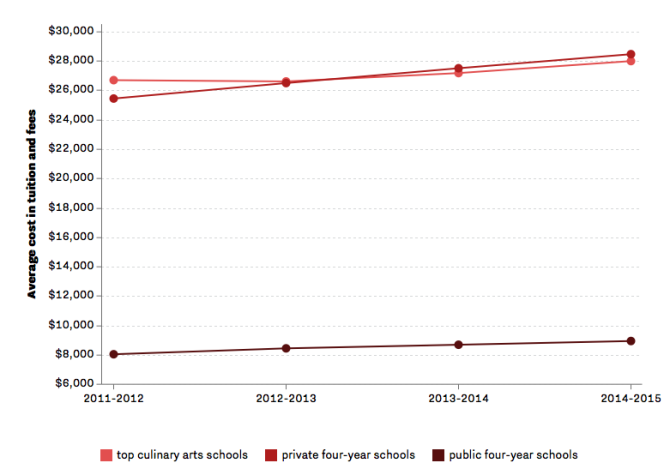
Photo courtesy of eater.com
The goal for me was to graduate from college and go straight to culinary school. It was essentially going to be my equivalent to getting a masters… until I saw the price tag.
Do you see those two lighter-red lines? That’s basically saying that culinary school would cost as much as my four-year education (which was roughly $60,000 a year in tuition).
That might seem reasonable if you’ve ever toured the facilities at some of the top culinary schools in America. But have you considered the length of their programs?
Let me break it down for you:
Culinary Institute of America (Hyde Park, NY) – Bachelor’s Program: $16,000 a semester for 4 years. It comes out to being over $128,000 in total, including room and board.
International Culinary Center (NYC): $40,000 for 6 months.
Institute of Culinary Education (NYC): $40,000 for 8 months.
Cordon Bleu: ~$40,000 for an associate’s degree, which is around 21 months, depending on the location
Yeah… no.
2. You’ll graduate with a lot of debt that won’t be easy to pay off.
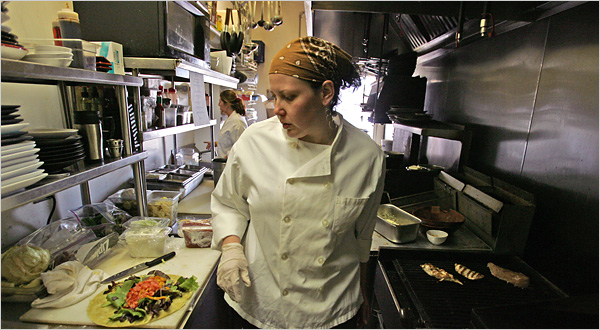
Photo courtesy of nytimes.com
Unless you’re rolling in cash, you will graduate from culinary school in debt.
Let’s just think about it for a second. You’re paying the same amount of money for a culinary education that you would be paying for a liberal arts education, but the job you’re graduating with pays minimum wage instead of $40k.
Unless you happen to snag a job at one of the better restaurant groups out there, you’re probably going to make an hourly wage between $7-11/hr for an entry level job that involves a lot of peeling and cleaning produce.
Don’t get me wrong, I know you have to pay your dues in this industry. And a blue collar job that you enjoy isn’t a bad thing. But when you also have to pay your bills and steep loans, well… that sucks.
3. Statistics show income doesn’t increase with additional culinary education.
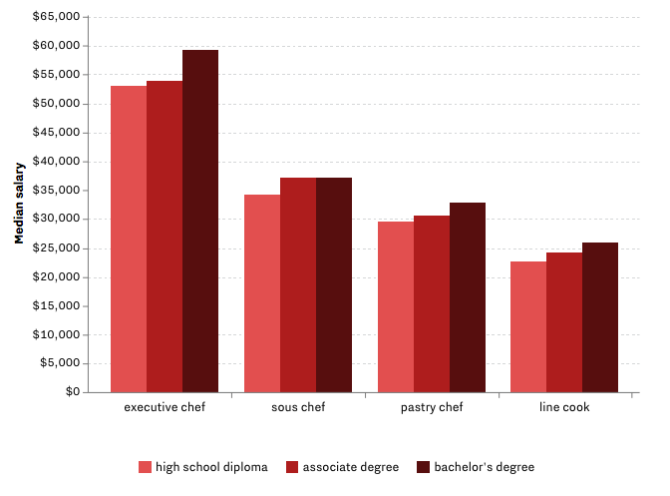
Photo courtesy of eater.com
You do not need to get a bachelor’s degree in culinary education to make more than the next guy in this industry. It literally doesn’t matter if you just have a high school degree. A $2,000 difference in salary is basically negligible.
4. It’s also not just a job, it’s a lifestyle.

Photo courtesy of Twitter

Photo courtesy of Twitter

Photo courtesy of Twitter
Many people are unaware of how hard it is to be a cook. Take me for example (see embarrassing tweets above). I got my ass handed to me when I took my first kitchen job during the summer after my sophomore year in college.
I expected to work with someone incredibly patient, like Ina Garten, to bake wonderful and magical dishes at a snail’s pace and really absorb what he/she was teaching me. Man, oh man, was I wrong.
Culinary school offers Externships so people can really understand what they’re getting themselves into, but most people who go to culinary school haven’t had real kitchen experience until that part of their education.
So unless you want to pay half of your tuition to realize that you hate working weekends, being screamed at, not getting holidays off, working 60 hour weeks, and being smelly and sweaty all the time, then don’t do it.
5. A certificate doesn’t mean you can call yourself a chef.
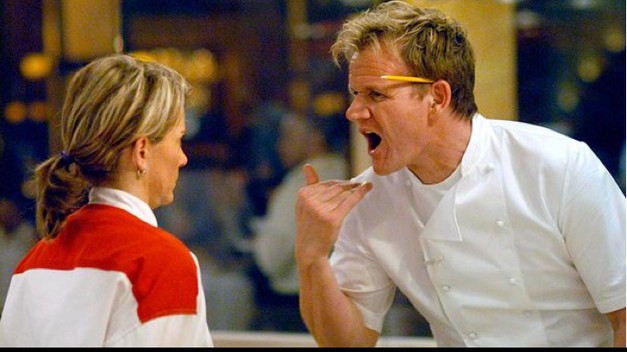
Photo courtesy of rubberband.com
One of my biggest pet peeves of working in the food industry is when people call me a pastry chef. I literally just want to scream in their face, “I AM NOT A CHEF.”
Why? Because associating my two short experiences working in pastry kitchens with the title “chef” completely undermines the dedication, time and effort it takes to earn that title. The chefs that I know have worked in the industry for years and have tirelessly climbed the hierarchy to get there.
So if you think that working your butt off in school for 6 months will make you a chef, think again.
6. If you go to culinary school to be on the Food Network, you will not be on the Food Network.
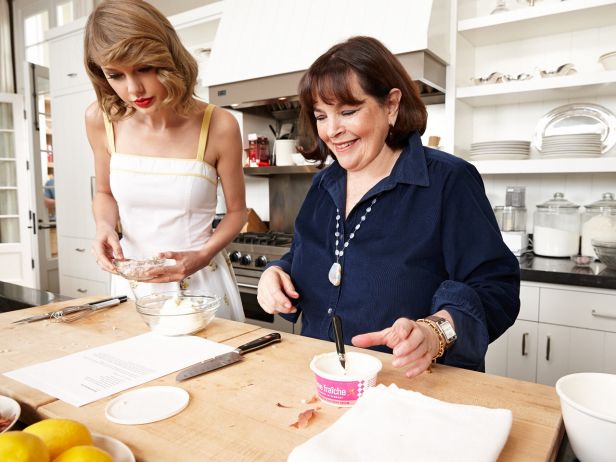
Photo courtesy of cheezburger.com
You think Ina Garten chose to give up her high-paying government job to own a small food store in the Hamptons with the intention of becoming a food celeb? Hell no.
She did it because she wanted to, because she loved food, and because she needed somewhere to channel her need to throw dinner parties all the time.
Her fame is a byproduct of her passion. If you don’t love cooking, don’t do it, and certainly don’t pay for it.
7. Depending on the program, you may only learn a technique once, and then have to completely relearn that technique at your new job.
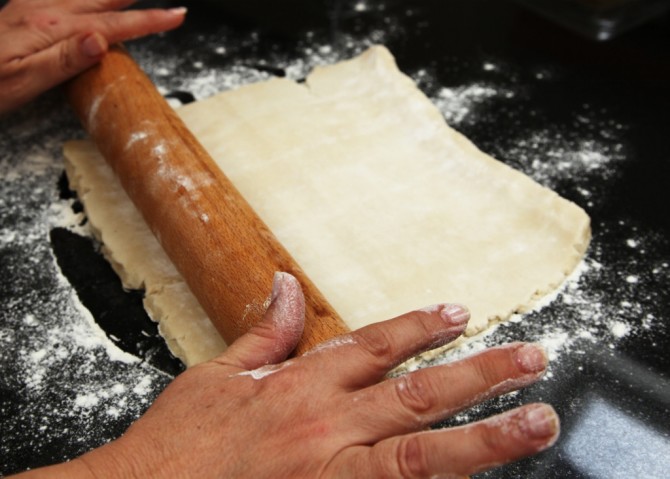
Photo courtesy of lemonsqueezy.eu
When I was debating on whether or not to go to culinary school, almost all of the cooks I know told me it’s not worth the debt. Depending on the program, you may only learn a technique once.
It’s up to you to really practice that technique outside of class, like any normal education expects of you. But when it requires materials and a kitchen, it becomes a little bit harder, especially if you add in a part-time job to pay for said education.
Also, many restaurants have their own ways of doing things. So that very classical French training that you got at school may not even apply to the way they do things at each job you take.
8. Chefs like hiring people who haven’t been molded by culinary school.
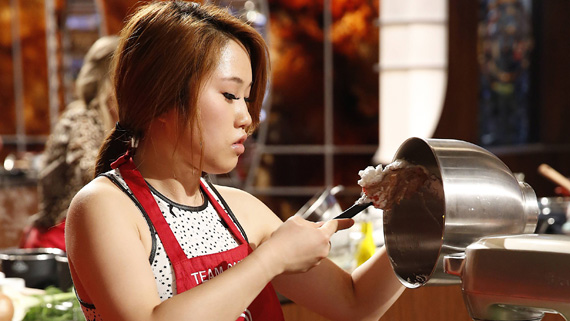
Photo courtesy of ctv.ca
When people get a traditional culinary education, many times they think that it’s CIA’s way or die. That stubbornness and inflexibility is a huge downfall in an industry that demands you adapt to each new kitchen setting.
People who haven’t gone to culinary school, on the other hand, are apparently more open-minded and accepting of the different styles and techniques of the various chefs they work for.
9. Everything you pay to learn in culinary school can just as easily be learned in the field while getting paid.

Gif courtesy of giphy.com
Seriously, why not just throw yourself into this crazy industry and get paid to learn how to bake shit instead of paying for someone to teach you something once? Think about it.

